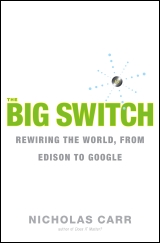"We are scanning them to be read by an AI."

Towards the end of the last chapter of his book, Nicholas Carr relates an anecdote about the visit of a guest speaker to the Google headquarters (emphasis added):
George Dyson, a historian of technology..., Freeman Dyson, was invited to Google's headquarters in Mountain View, California, in October 2005 to give a speech at the party celebrating the sixtieth anniversary of von Neumann's invention [of an electronic computer that could store in its memory the instructions for its use]. "Despite the whimsical furniture and other toys, "Dyson would later recall of his visit, "I felt I was entering a 14th-century cathedral -- not in the 14th century but in the 12th century, while it was being built. Everyone was busy carving one stone here and another stone there, with some invisible architect getting everything to fit. The mood was playful, yet there was a palpable reverence in the air." After his talk, Dyson found himself chatting with a Google engineer about the company's controversial plan to scan the contents of the world's libraries into its database. "We are not scanning all of those books to be read by people," the engineer told him. "We are scanning them to be read by an [artificial intelligence engine]."
So concludes this work -- a view of technical progress from the emergence of electricity to the emergence of what Carr calls "the World Wide Computer." In successive chapters, he builds the story line from the harnessing of electricity for commercial use to the economics of the migration from private power generation to common utility. He then uses that story line to illustrate the change happening with isolated computers being supplanted by a common computing utility. Call it a "grid" or "computing in the cloud," Carr's vision of the future is dominated by a computing infrastructure that is greater than the sum of its parts: an infrastructure that we are all a part of building right now and an infrastructure that is as inevitable as the emergence of the electric utility that our lives depend on. An infrastructure built on the knowledge embedded in the choices each of us make online and the machine's comprehension of the knowledge gleaned from the scans of the books of the world's libraries.
Carr's work is easy to read -- clearly the work of a writer who excels at expressing himself clearly. The ease at which one can read the words, though, only underscores the utterly transformative nature of the world now emerging. The picture he paints is not only of a rosy, utopian future, however. Carr gives equal time to the problems and challenges of the "big switch" to the World Wide Computer. But he makes clear that the World Wide Computer is in our future, just as sure as we are of what happens each time we flip a light switch.